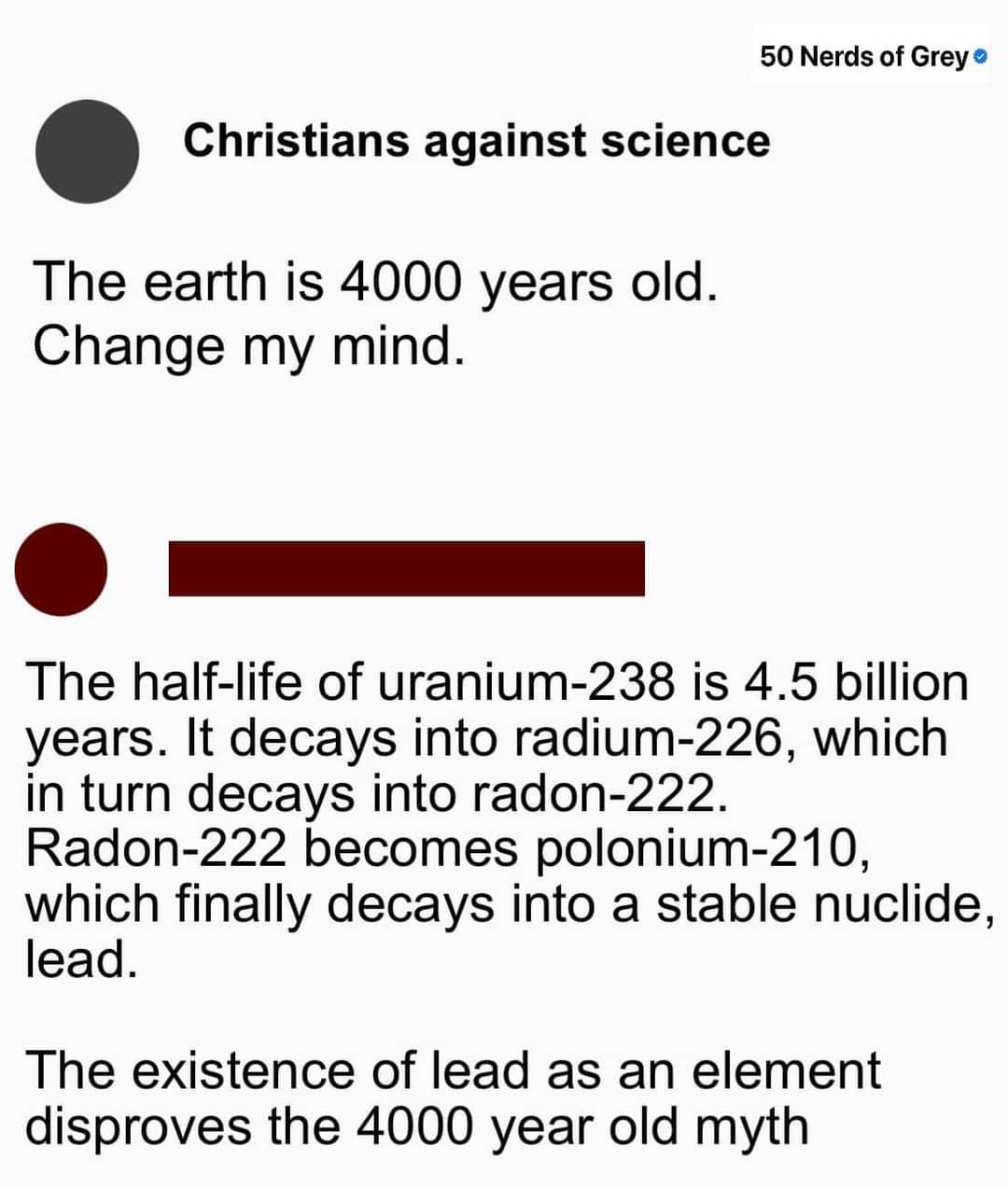this post was submitted on 24 Oct 2024
1169 points (92.1% liked)
Science Memes
11148 readers
3097 users here now
Welcome to c/science_memes @ Mander.xyz!
A place for majestic STEMLORD peacocking, as well as memes about the realities of working in a lab.

Rules
- Don't throw mud. Behave like an intellectual and remember the human.
- Keep it rooted (on topic).
- No spam.
- Infographics welcome, get schooled.
This is a science community. We use the Dawkins definition of meme.
Research Committee
Other Mander Communities
Science and Research
Biology and Life Sciences
- [email protected]
- [email protected]
- [email protected]
- [email protected]
- [email protected]
- [email protected]
- [email protected]
- [email protected]
- [email protected]
- [email protected]
- [email protected]
- [email protected]
- [email protected]
- [email protected]
- [email protected]
- [email protected]
- [email protected]
- [email protected]
- [email protected]
- [email protected]
- [email protected]
- [email protected]
- [email protected]
- [email protected]
- !reptiles and [email protected]
Physical Sciences
- [email protected]
- [email protected]
- [email protected]
- [email protected]
- [email protected]
- [email protected]
- [email protected]
- [email protected]
- [email protected]
Humanities and Social Sciences
Practical and Applied Sciences
- !exercise-and [email protected]
- [email protected]
- !self [email protected]
- [email protected]
- [email protected]
- [email protected]
Memes
Miscellaneous
founded 2 years ago
MODERATORS
you are viewing a single comment's thread
view the rest of the comments
view the rest of the comments

Self-referential paradoxes are at the heart of limitative results in mathematical logic on what is provable, so it seems plausible a similar self-referential statement rules out omniscience.
Greek gods are gods in a different sense than the monotheistic conception of god that is omniscient, omnipotent and omnibenevolent. Sure, so the argument I give only applies to the latter sense.
@science_memes
That's not a paradox though, it's a silly logic puzzle that isn't hard to solve. It doesn't prove or disprove anything about omniscience or gods.
It is a paradox if you believe there are omniscient beings. If there are no omniscient beings, there is no paradox. The sentence is either true or false. If the sentence is true, we have an omniscient being that lacks knowledge about a true statement. Contradiction. If it is false, there is an omniscient being that knows it to be true. This means that the statement is true, but the statement itself says that no omniscient being knows it to be true. Contradiction.
@science_memes
It's not a paradox, it's a dumb logic puzzle. It's no different than saying something nonsensical like "This sentence contains 2 words".
No, if it is false, then it is simply wrong. A wrong sentence doesn't imply something else is right, it's just wrong.
"This sentence contains 2 words" is a sensible sentence. It has 5 words, so what the sentence says is false.
The self-reference in the sentence is similar to that of the Liar's paradox. Cousins of that paradox have been used to prove major limitative results in mathematical logic such as
https://en.wikipedia.org/wiki/Tarski%27s_undefinability_theorem
https://en.wikipedia.org/wiki/Gödel%27s_incompleteness_theorems
In usual logic, a false sentence implies every sentence.
https://en.wikipedia.org/wiki/Material_conditional
Also, if sentence P is false, then "P is false" is true
@science_memes
"J Lou has stopped beating their spouse."
If this sentence is true, it means you used to beat your spouse. If it is false, it means that you currently beat your spouse. Therefore, it proves that you are married and at some point in time you beat your spouse.
That sentence has a presupposition. The sentence I used can be fully formalized in a logic with predicates for knowledge of an entity and truth
@science_memes
Also has a presupposition.
I'm sure the official line would be that God is also ineffable to man. "omniscience" as some human has expressed it in whatever flawed language it is probably a flawed translation from ineffable divine meaning.
Where is the evidence that god is actually "omniscient" or caims to be in the way that this proof interprets the term? It seems like hearsay to me.
But irrespective of what this god-thing may or may not have said about itself to whom, I don't see how the statement does more than show that "'omniscience' is a poorly defined/illogical term". Or maybe, "People who use the word 'omniscience' to describe the extent of knowledge are not expressing themselves clearly or accurately".
This should not be all that surprising as most humans - as I understand them - rarely need to communicate clearly about infinites - so those that do should probably not use English and choose a more apposite language. Maybe hebrew or watever languages these supposed prophets might have used has better terminology.
I suspect Moses might have flunked maths.
Man I don't know if I'll ever get over seeing Mastodon toots on Lemmy and all of the other wild cross-fediverse fun the Fediverse enables
I didn't notice until you said something. Wild.